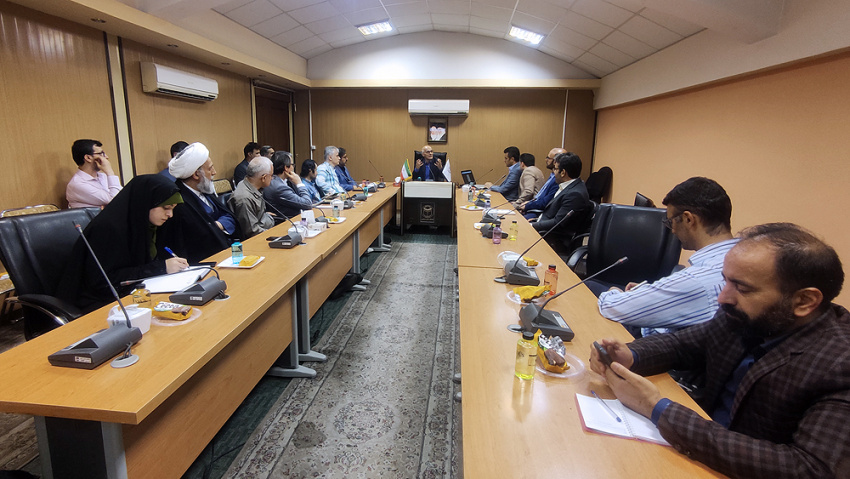Dr. Maqsoud Farasatkhah: The Mission of Universities and Elites Is to Guide Society Toward Mutual Understanding and Peaceful Coexistence Amid Diversity

A scholarly session titled “The Social Responsibility of Universities in Promoting and Expanding the Culture of Coexistence in Pluralistic Spaces” was held on Monday, May 20, 2025, organized by the Research Department of the International University of Islamic Denominations, in the university’s conference hall. The session featured a keynote speech by Dr. Maqsoud Farasatkhah, a prominent scholar in social studies and higher education, and was attended by faculty members, researchers, and students.
In his remarks, Dr. Farasatkhah pointed to the complexities of cyberspace and said: “Cyberspace is a diverse and dynamic world that is rapidly evolving. It brings together conversations among individuals with differing views, and this diversity is both a challenge and a learning opportunity.” He continued: “Iran has a rich historical background of ethnic, religious, linguistic, and cultural diversity. This diversity is a long-standing heritage of this land, and with the advent of new technologies, these differences have become more visible than ever.”
Highlighting the significant growth in higher education in Iran, he noted: “In recent decades, literacy and access to higher education have grown dramatically. Today, over 21 million students are enrolled in Iran’s universities, indicating a major transformation in the country’s educational system.” He also emphasized the impact of technology on human life: “Technology has not only transformed our lives but also influenced our attitudes and beliefs. Every day, an enormous amount of data is generated, and managing this information requires new skills.”
Stressing the growing trend toward individualism in Iranian society, he said: “Every person has the right to their own beliefs, values, and way of life. This plurality of views can lead to both growth and conflict. Therefore, we must learn tolerance, acceptance, and mutual understanding.” He emphasized: “We must learn to live in a pluralistic world. Parents and the education system must prepare the younger generation for life in such a world—a world that requires mutual understanding and communication skills.”
Referring to the broad responsibility of universities in the cultural and social life of communities, Dr. Farasatkhah stated: “Universities cannot confine themselves merely to the production of knowledge. They must play an active role in promoting the culture of coexistence, dialogue, tolerance, and social ethics.” Highlighting the role of universities in educating the youth, he said: “Universities have a great responsibility to prepare students for life in today’s complex world. Students must learn how to live with differences in a diverse society. This preparation includes ethical, intellectual, and practical skills.”
He added: “The philosophy of higher education should lead to intellectual maturity—a mind that can perceive and understand ‘the other.’” The winner of the 42nd Islamic Republic Book of the Year Award, Dr. Farasatkhah, referred to three foundations of coexistence in pluralistic societies: exclusivism, radical relativism, and complementarity. He touched on the subject of truth and dialogue: “Many global conflicts stem from differing perceptions of ‘truth.’ If we accept that absolute truth does not reside solely in the view of one person or group, we open a space for dialogue and understanding.” He emphasized, “Truth appears in the face of the other.”
He proposed that: “Classrooms at the University of Islamic Denominations should become multi-voiced spaces, with roundtables for dialogue.” In conclusion, Dr. Farasatkhah emphasized Iran’s intellectual and cultural assets and said: “The ‘other’ is an opportunity. We have valuable resources in Iran that should be used to build a society based on dialogue, tolerance, and understanding.” He concluded that promoting a culture of coexistence in pluralistic environments can only be achieved through participatory, creative, and dialogue-based approaches, stressing the interdisciplinary roles of social sciences, religion, and the arts. The session ended with an open, dynamic exchange of views and questions between professors and students.

Your Comment :